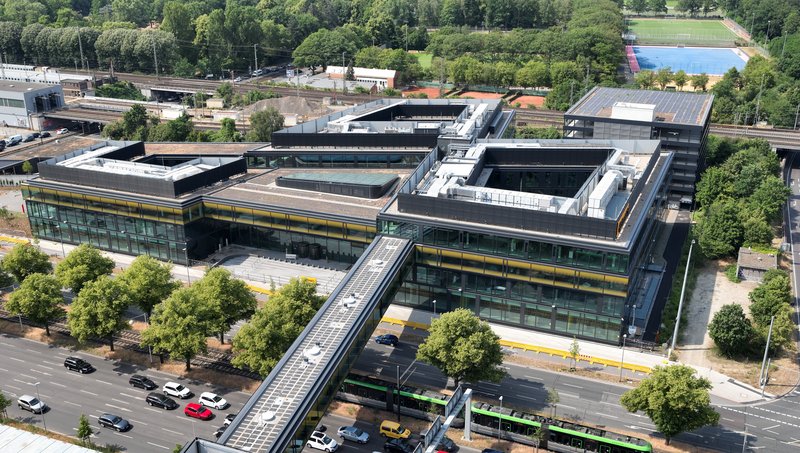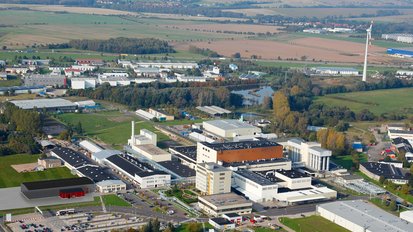ESG at Continental
Investing sustainably
Continental works as a technology company for safe, intelligent and sustainable mobility and material solutions that contribute to clean air and accident-free, comfortable driving.
Our sustainbility strategy defines our four focus areas and the goals that we have set ourselves. It also describes our eight essentials for sustainability.
In our four focus areas, we are committed to our strong, visionary ambitions, which we want to achieve by 2050 at the latest, together with our partners along the value chain.
Our four focus areas
They are associated with major challenges for Continental, but also with great opportunities. We are convinced that acting sustainably will increase our capacity for innovation and our future viability by opening our company to change and helping identify risks and opportunity at an early stage.
Reporting Standards
Continental expressly recognizes the 10 principles of the United Nations Global Compact for Human and Employee Rights, Environmental Protection and Anti-Corruption Measures. The reporting considers the standards of the Global Reporting Initiative (GRI), the UN Global Compact, the UN Sustainable Development Goals (SDG), the Task Force on Climate-related Financial Disclosures (TCFD), and the Sustainability Accounting Standards Board (SASB).
Integrated Sustainability Report 2023
Continental has published a sustainability report every year since 2012 and a combined non-financial statement each year since 2018, with both reports looking at the past fiscal year. The main medium of our sustainability reporting is the integrated sustainability report. This report brings together information, in a modular format, from the company’s combined non-financial statement, management report, consolidated financial statements and other sources, as well as additional information.
Read the integrated Sustainability Report 2023 - pdf (7.73MB).
Anchoring ESG issues in Executive Board Remuneration
The remuneration of the Executive Board members is aligned with the long-term and sustainable development of the company. The Executive Board and global managers are measured against the achievement of sustainability goals based on our sustainability ambitions.
Performance criteria:
Own CO2 emissions, Waste for recovery quota, accident rate, women in management positions, sustainable engagement.
Presentations on ESG Topics
Within the Executive Board, the Executive Board member for Group Human Relations (director of Labor Relations) and Group Sustainability is responsible for sustainability. Sustainability management within the Continental Group is regulated by a dedicated internal sustainability policy.
The Group Sustainability group function is further supplemented by sustainability functions in the group sectors as well as coordinators in several business areas and countries. The key sustainability functions were expanded and strengthened in 2022. The Group Sustainability Steering Committee is responsible for assessing interdepartmental issues, weighing up risks and opportunities and discussing relevant Executive Board decisions in advance. In fiscal 2022, it consisted of the entire Executive Board as well as the heads of the sustainability functions at corporate level and group sector level as well as the heads of other relevant group functions.
In our four focus areas of sustainability, we are committed to our strong, visionary ambitions, which we want to achieve by 2050 at the latest, together with our partners along the value chain.
Carbon Neutrality
We strive for 100% carbon neutrality along our entire value chain (products, operations, supply).
Emission-free Mobility and Industries
We strive for emission-free mobility and industries.
Circular Economy
We strive for 100% closed resource and product cycles.
Responsible Value Chain
We strive for 100% responsible sourcing and business partnerships.
1 ”Emission-free“ refers to zero emissions like greenhouse gases or NOx but does not include harmless emissions like water vapor emissions, non-toxic biodegradable particulate emissions or a minimum of noise emissions.
Our eight sustainability essentials represent the backbone of our sustainability management.
Operational environmental management is a fixed component of our company policy. Our corporate environmental strategy aims to continuously reduce energy and water consumption, CO2 emissions and waste in our own operations, while simultaneously increasing the recovery quota for operational waste.
Our strategy, which defines the objectives, key figures and measures, forms the framework for our environmental management activities. We are guided in this by the United Nations’ sustainable development goals (SDGs). We have four strategic focus areas:
carbon neutrality
energy efficiency
water protection
and waste reduction in our own operations.
We are fully committed to the Paris climate agreement. The Continental Group’s 2040 climate goal and ambition for 2050 were reviewed by the Science Based Targets initiative (SBTi) in 2020 and our interim targets for 2030 were confirmed as being compliant with the Paris climate agreement. The derived absolute emission reductions for our own operations are set to keep us on track for the 1.5°C pathway. In order to achieve its targets, Continental has identified several opportunities to reduce emissions and, for example, has been purchasing electricity exclusively from renewable sources at all of its own sites since 2020.
To ensure consistency with the most recent climate science and best practices, targets must be reviewed, and if necessary, recalculated and revalidated, at a minimum every 5 years. The latest year in which companies with already approved targets must revalidate is 2025.
In 2022, Continental introduced an internal price on carbon to support and accelerate the transformation to become carbon neutral with respect to Scopes 1 and 2 by 2040. The internal price on carbon is part of the Decarbonization Roadmap 2040 and is valid for all group sectors.
Continental has been awarded the top rating from international organization CDP for its leading role in climate change mitigation. The technology company has for the first time been included in the annual A list for its transparency and performance in relation to climate change. This makes Continental one of the few companies to achieve an “A” in the area of climate change mitigation.
Continental has been taking part in the most important environmental ranking for 12 years. Last year, the technology company achieved an “A-” in the area of climate change mitigation. Since the end of 2020, Continental has powered its production facilities entirely with renewable electricity. The company aims to achieve carbon neutrality in production by 2040 and in its entire value chain by the end of 2050.
In the area of sustainable water management, Continental maintained its performance from the previous year, once again receiving a “B”.
For the fifth time in a row Continental was awarded the highest rating by CDP for its efforts in implementing measures and strategies to reduce emissions in the supply chain ("Supplier Engagement Rating"). This puts Continental among the eight percent of companies who were awarded top marks by CDP in 2022 for their commitment in this area. In particular, Continental's holistic approach of working closely with its suppliers to achieve broad improvements by involving as many stages of the supply chain as possible was recognized.
The non-profit organization awarded this distinction to only 1.5 percent of the companies that took part in the assessment.
Focus Topic
Sustainable Materials in Tire Production
By 2050 at the latest, all tires are to be made of sustainable materials. There is still a long way to go until then. But step by step, it is already becoming apparent which raw materials will find their way into tire construction in the future. These include waste products from agriculture – such as the ash from rice husks – rubber from dandelions, recycled rubber or PET bottles.
Already today, around 15 to 20 percent renewable or recycled materials are used in a standard passenger car tire from Continental.
UltraContact NXT: Continental Starts Volume Production of its Most Sustainable Tire
In 2023 Continental has started production of the UltraContact NXT, its most sustainable series tire to date, at its plant in Lousado, Portugal. With up to 65 percent renewable, recycled and mass balance certified materials, the new summer tire combines a remarkably high share of sustainable materials with maximum safety and performance. At the same time, all dimensions carry the highest possible rating in the EU tire label ("A") in rolling resistance, wet braking and exterior noise.
Recycled rubber from end-of-life tires
The mechanical processing of used tyres is a component of recycling. Rubber, steel and textile cord in particular are separated, in a highly sophisticated process, from one another. The rubber is then prepared for re-use as part of new rubber compounds.
Continental has a long history of working consistently to introduce end-of-life tires into the circular economy to conserve resources and the environment. A material known as “Conti-Reclaim” has been obtained as part of the truck tire retreading process at the company’s plant in Stöcken in Hanover since 2013. It has been used in tire production at Continental for years. To expand the range of applications for the recycled rubber and optimize the properties for the various fields of application, Continental uses not only “Conti-Reclaim” but also recycled rubber from other suppliers.
Natural Rubber from Dandelions: Taraxagum
We are convinced that the realisation of natural rubber from dandelions is a decisive step in the tire industry. With its potential to make our products and production processes even more sustainable, dandelion rubber is an important part of our extensive sustainability activities.
We have been researching the industrial use of dandelion rubber since 2011.
Russian dandelion (Taraxacum kok-saghyz) is a relatively low-maintenance plant that contains a high volume of natural rubber and grows in temperate regions across the world. This is a major advantage over the rubber tree (Hevea brasiliensis), which grows only in tropical climates – today mainly in Southeast Asia. Dandelion, however, can thrive equally well in North America and Europe. And it’s easy to cultivate, too: One field of dandelions is ready to harvest after just one or two years. All these factors mean that cultivation areas could be situated close to tire plants, which, among other key advantages, would help to reduce transportation distances.
Through its Taraxagum project, Continental is seeking to do its part to prevent ongoing tropical deforestation and reduce the carbon emission resulting from the long distances involved in transporting conventional natural rubber.
In 2014, an experimental tire of the WinterContact TS 850 P model with a tread made from dandelion rubber underwent comprehensive testing and passed with flying colors. At the 2016 International Motor Show Germany, Continental unveiled its first truck tire made from dandelion rubber. A Taraxagum bicycle tire from Continental is already on the market. Urban Taraxagum was unveiled at Eurobike 2018 and is the world’s first series-produced tire featuring a tread made from pure dandelion rubber.




















